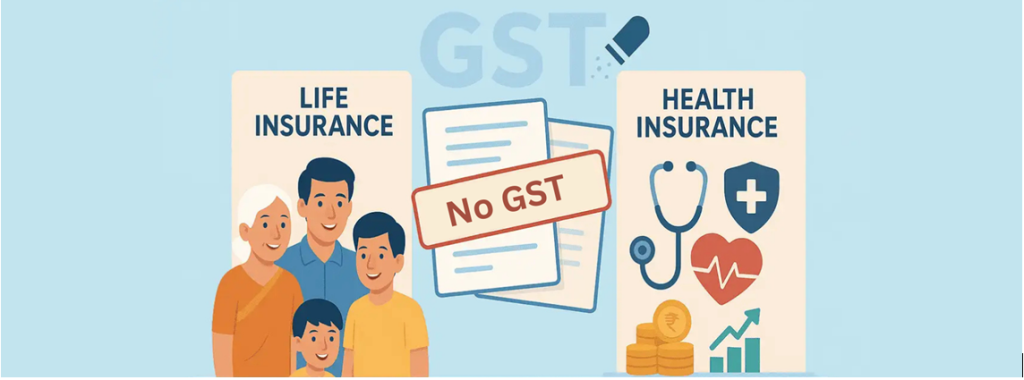The Indian government made a landmark decision in the 56th GST Council meeting: it removed the 18% Goods and Services Tax (GST) on individual health insurance and life insurance premiums
This change applies to new policies and renewals of eligible policies from that date onward. Here’s a breakdown of what has changed, who gains, and what you should know.
What Exactly Changed
- Previously, premiums paid for health insurance and life insurance individual policies were subject to 18% GST.
- After the reform effective 22 September 2025, that GST has been reduced to 0% (nil) for individual health policies and individual life policies, including ULIPs, term plans, endowment plans, etc.
- The change covers renewals of eligible policies where the premium is due on or after 22 September, as well as new policies issued on or after that date.
- However, group insurance policies (for example issued by an employer) will continue to attract 18% GST. They are not part of this exemption.
·
Who Benefits & How Much
Here are the benefits for different kinds of policyholders, and examples of savings.
| Policy Type | Before (with 18% GST) | After (0% GST) | Approx Savings* |
| Individual Health Insurance (e.g. family floater, senior citizen plans) | Premium + 18% GST on base premium | Premium only (no GST) | ~18% of base premium; e.g. on ₹30,000 base premium, you save ~₹5,400. |
| Individual Life Insurance (term, ULIP, endowment plans) | Same 18% GST added | No GST from 22 Sept | Similar saving percentage (~18%) on base premium. |
| Existing Policies renewing before 22 Sept | Still have to pay 18% GST | No change (GST still applies) | No savings until renewal date is after 22 Sept. |
| Group Insurance / Employer-Provided Covers | 18% GST continues | Still 18% GST (exemption not applicable) | No direct saving unless policy is converted to individual cover or changed after policy design. |
*Savings are illustrative; actual amounts vary depending on premium, policy type, insurer charges, etc.
Things to Keep in Mind / Limitations
- Zero GST does not immediately mean you will always pay 18% less. Since insurers can lose input tax credit (ITC) on their expenses (marketing, agent commissions, administration etc.), they might adjust base premiums partially to offset cost.
- If your premium renewal date is just before 22 September, you won’t get the benefit until the next renewal cycle. So renewal timing matters.
- Check whether your policy is categorized as “group” or “individual.” Only individual policies are clear beneficiaries. Group policies still attract GST.
- Ensure insurers properly implement and pass on the savings. There is monitoring from regulators and customers will need to verify the new invoice/premium details.
·
What This Means for Consumers
- Lower Take-home Cost: For many, this means the out-of-pocket cost of taking or renewing health or life insurance will reduce by around 15-18% depending on base premium.
- Better Affordability: Especially for middle-income households, senior citizens, families, who may have been hesitant due to higher premiums?
- Increased Insurance Penetration: More people may now consider going for health/life coverage; this could boost insurance usage across India.
- More Transparent Pricing: With the removal of GST, pricing becomes simpler: you see the base premium without “tax on top.”
Conclusion
The GST exemption on individual health and life insurance premiums, effective from 22 September 2025, is a major win for consumers. It reduces cost, simplifies pricing, and makes insurance more accessible.
If you are planning to buy or renew an individual health or life insurance policy, make sure it’s new or due for renewal after Sept 22, and that it is indeed an individual policy. That way you’ll get the full benefit of zero GST.
Need help understanding insurance
Consult us.
Email: info@insuranzee.com
Contact +91-9202677297

